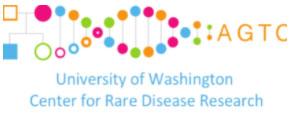The GREGoR Consortium includes five Research Centers and a Data Coordinating Center.
Credit: Ernesto del Aguila III, NHGRI.
Research Centers
See the Collaboration page for a matrix showing focus areas of research for each Center.

The vision of the BCM-GREGoR research program is to translate genomic discovery and functional phenotyping to precision molecular diagnosis in the clinic whilst advancing genomics and human genetics research. We seek to advance understanding of gene function through definition of all Mendelian disease traits and cataloging of the phenotypic impact of variant alleles across all ~20,000 protein coding genes. Clinicians and diagnostic laboratories will be invaluable partners as we strive to drive this new knowledge to the “front lines” of healthcare.
Award U01HG011758
Contact PI(s):

The Broad Institute focuses on improving diagnosis and Mendelian gene discovery through large scale sequencing, methods development, and data sharing. Phenotype areas of high interest include but are not limited to orphan/syndromic, neurodevelopmental, and neuromuscular disorders which come to our center through US and international collaborations with research or clinical groups or through direct to patient recruitment within the US through the Rare Genomes Project. Our approach includes trio exome sequencing, and deeper investigation of exome negative cases with RNAseq, short and long read genome sequencing, application of methods for improved variant detection, CRISPR cell culture models for variants of uncertain significance, data aggregation, and data sharing.
Award U01HG011755
Contact PI(s):

Our goal is to provide a platform for functional genomics research and validation to improve diagnosis in Mendelian disease. We believe that the systematic application of promising new genomics technologies coupled with innovative computational approaches will foster discovery. Research participants who remain undiagnosed after exome sequencing will undergo short read and long read genome sequencing, transcriptome sequencing, methylation assays, metabolomics and/or lipidomics assays. Novel causal variants and genes will be validated through state-of-the-art targeted approaches including massively parallel reporter assays, induced-pluripotent stem cell assays and CRISPR engineered cellular and mouse models. Our approach will help elucidate the most effective ‘omics’ strategies to improve Mendelian disease discovery and diagnosis.
Award U01HG011762
Contact PI(s):
 ,
, 
To accelerate the pace of Mendelian disease gene discovery and clinical implementation, we propose a Mendelian Genomics Research Center, part of the GREGoR Consortium, leveraging the broad pediatric and adult clinical and research expertise at Children’s National Hospital and University of California, Irvine. Our goal is to develop best practices to increase the diagnostic yield of rare diseases, engage the Community to reduce health disparities for complex diagnoses, while creating a dataset accessible to all. Our Center will unite world class experts combining basic and translational research with innovative approaches to phenotyping, variant identification and functional investigation of both coding and non-coding sequence changes with the goals of discovering novel Mendelian gene variations and identifying variants not detected on current sequencing pipelines, disambiguating uncertain variants into disease-causing versus benign categorizations, and sharing information by working collaboratively with the GREGoR community.
Award U01HG011745
Contact PI(s):

Mendelian conditions are rare disorders caused by sequence changes of the genome. While genes underlying thousands of Mendelian conditions have been identified, there are thousands of Mendelian conditions for which the gene(s) and sequence changes have yet to be discovered. The UW-CRDR collaborates with an extensive network of clinicians and investigators worldwide and applies cutting edge technologies including next generation sequencing, new analytical tools, and data-sharing innovations to discover new sequence changes and gene(s) that underlie Mendelian conditions. Understanding the genetic basis of Mendelian conditions provides the most efficient way to understand the function of the human genome, enables clinical diagnosis of rare disorders, and represents the keystone of the foundation of precision medicine.
Award U01HG011744
Contact PI(s):
Data Coordinating Center

The DCC, based in the University of Washington’s School of Public Health (the Genetic Analysis Center in the Department of Biostatistics), partners with NHGRI and oversees these aspects of the Consortium’s activities:
- Management of data release (data models, harmonization and Quality Control);
- Management of program outreach (engage clinicians, families and researchers);
- Coordination of logistics for the GREGoR Consortium (including committee, working group and Consortium meetings; Consortium communications; and engagement with policies and standards to support Consortium goals and work); and
- Management of the Opportunity Fund (small awards to support the work of researchers from outside the Consortium to follow up on promising findings in Mendelian studies - beginning in year 2 of the project).
Award U24HG011746
Contact PI: